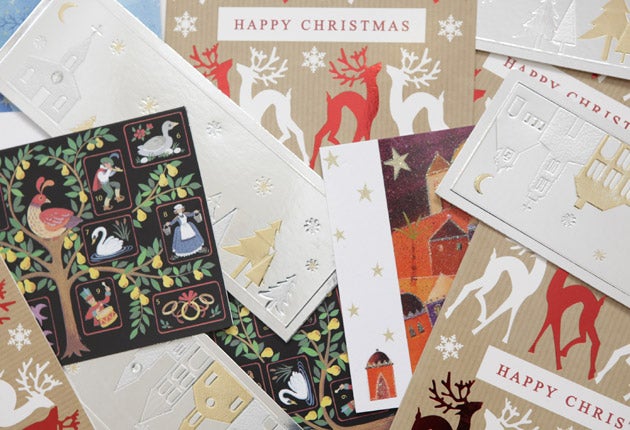And the Scrooge award for the stingiest charity card seller goes to...
...Cards Galore, for the second year running, at just 4.2 per cent of the cover price. Chiara Cavaglieri reports that the amount that Christmas card sellers actually pass on to good causes varies enormously

We may like to think we're doing our bit when we buy charity Christmas cards, but many of the high-street retailers donate as little as 4.2 per cent of the cover price of the card to the charity concerned, according to the Charities Advisory Trust (CAT).
Every year, the trust surveys the high street to compare how much is being giving to charity and awards the Scrooge award to the stingiest retailer. For the second year running Cards Galore was bottom of the pile, donating just 4.2 per cent of the cover price to the British Heart Foundation and offering less than 10 per cent to charity with 65 per cent of its charity cards. The Georgy Porgy award for greed was handed out to Fenwick which gives less than 10 per cent across 90 per cent of its charity card range.
"The retailers think they're being very generous, but they are not," says Dame Hilary Blume, director of CAT.
On a more positive note, after being named as one of the worst stores for donations in previous years, Harrods has this year been labelled a "reformed sinner" for introducing a minimum 10 per cent donation across its range. Elsewhere, the more generous retailers include Debenhams and Marks & Spencer, which both donate 20 per cent of the price to various charities including the NSPCC and Shelter.
From the charities' point of view, having retailers sell charity Christmas cards is an easy way to raise funds with no financial risk, because the printing and distribution costs are paid by the retailer or card publisher.
"The thing with charity cards is that people need to understand exactly what they're getting. The high-street retailers are not being mean because there is no financial outlay for the charity. It's free money that they wouldn't otherwise have," says Mark McArthur-Christie, a director at Cards for Good Causes.
However, Dame Hilary argues that the big charities need to shoulder some of the responsibility for the low donations, and should try to get as much money as possible for their causes when signing up to agreements with shops. Moreover, many charities are allowing their name to be put to cards printed in China, rather than the UK, which sits at odds with their charitable efforts.
"It takes two idiots to make a bad agreement. My argument is that the big charities have some power to negotiate with the retailers and if Cancer Research UK can't get 10 per cent out of them, what's going on?" she says.
The good news for consumers is that these cards must have the donation on the back – so if you pick up a pack donating less than 10 per cent, try another retailer. Even better, head to a charity card shop where between 40 and 60 per cent of the purchase price goes to the charity.
Get a free fractional share worth up to £100.
Capital at risk.
Terms and conditions apply.
ADVERTISEMENT
Get a free fractional share worth up to £100.
Capital at risk.
Terms and conditions apply.
ADVERTISEMENT
There are also temporary multi-card shops set up by the likes of Cards for Good Causes, often found in village halls, libraries and churches. These sell cards on behalf of more than 300 charities, and have much smaller running costs so they can give back at least 75p in every £1, although from this 75p charities must take out their printing, distribution and VAT costs so the amount being used for charitable causes will be much less.
Meanwhile, Card Aid shops give all profits to charity, working out to as much as 60 per cent of the card price. Not only that, but all printing takes place in the UK, and the card and envelope come from sustainable forests. Oxfam Unwrapped also offers virtual charity gifts such as goats, cows and bags of seeds which you can buy on behalf of a loved one. You get to choose a printed card to give to them, and Oxfam will send that gift to wherever it's needed most.
One of the best ways to give, however, is to donate money directly to your charity of choice, and remember, if a UK taxpayer, to tick the Gift Aid box which means that for every £1 donated Her Majesty's Revenue and Customs (HMRC) will add an extra 28p.
"People need to remember that Christmas cards are not the only way to support charities over the festive season. Why not donate directly to your chosen charity instead of buying cards and send a Christmas email or Facebook message instead?" says Richard Harrison, a director at the Charities Aid Foundation.
Join our commenting forum
Join thought-provoking conversations, follow other Independent readers and see their replies
Comments
Bookmark popover
Removed from bookmarks